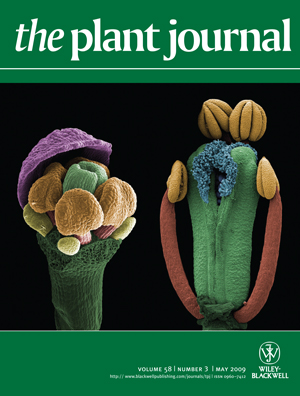John C. Walker
John C. Walker

PhD, 1985 University of Georgia
Molecular mechanisms regulating cellular signaling in plants
False-colored scanning electron micrographs of two partially dissected cuc2-1D flowers. These show a variety of developmental abnormalities, including enlarged components and disrupted patterning. The enlarged flower on the left illustrates a young developmental stage before the flower has opened, while the flower on the right illustrates a mature flower that has fully opened.
Multicellular organisms need to carry out many processes in a coordinated manner to sense and respond to both external and internal signals in an intricate and precise way. Multi-step signal transduction creates the necessary complexity for refined regulation of a cell's response to developmental signals and its environment. A common way cells relay molecular messages is by reversible protein phosphorylation; protein kinases add phosphates to their target protein(s) and protein phosphatases remove them. Cells can begin this process with receptor protein kinases, using phosphorylation status to transduce external messages into the cell. A plethora of candidate receptor protein kinases have been found in plants, but only a few have been investigated. Function for the plant receptor-like kinases (RLKs) has been shown in various biological processes such as development, disease resistance and self-incompatibility.
There are several hundred RLK genes and they represent the largest group of cell surface receptors in plants. The 1999 report of the NSF-Sponsored Workshop: New Directions in Plant Biological Research points out the RLKs represent unexpected discoveries derived from the Arabidopsis genomic sequence. The report states, "What are the roles of the hundreds of these proteins? Their existence implies a massive network of cell-cell and environment-plant communication, via a series of ligands yet to be discovered. Understanding this network will give us an entirely new view of plant development, environmental response, and organismal integration”. Our research is directed toward understanding the function of the RLK genes.
We are using the approaches of functional genomics and proteomics to understand RLK function. We have ongoing projects to 1) Isolate and characterize loss-of-function and gain-of-function mutations; 2) Determine the patterns of expression of the mRNAs, and establish the cellular and subcellular locations of these receptors by use of green fluorescent protein fusions; 3) Define the regulatory networks that mediate signaling by these protein kinases by screening for genetic modifiers and interaction partners. Although we are not yet able to describe an entire signal transduction cascade for any one RLK, these approaches promise to provide important insights into the molecular mechanisms by which the receptor protein kinases control development and adaptive responses in plants.
Director, Division of Biological Sciences, 2011-2020
Curators' Distinguished Professor, University of Missouri 2014
Excellence Award, Interdisciplinary Plant Group, MU 2012
Fellow, American Association for the Advancement of Science 2004
Chancellor’s Award for Outstanding Faculty Research and Creative Activity in Biological Sciences 1997
